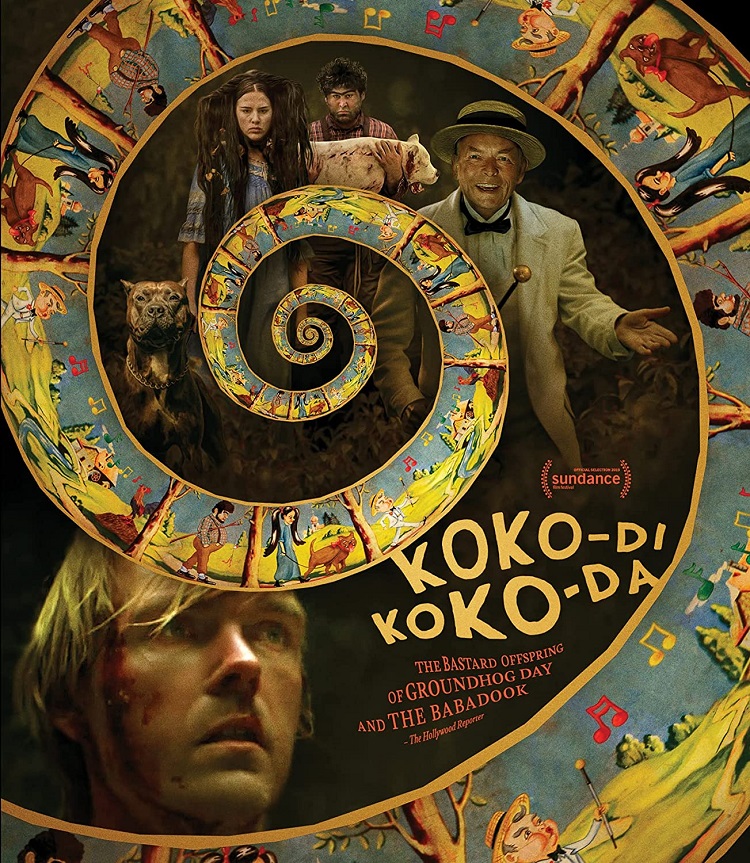
Written by Michael Frank
I’ve never been a huge fan of horror movies. Jump scares, bloody creatures, and demonic possessions aren’t really my cup of tea. I see them all as one movie: a predictable, harrowing couple of hours that never ceases to keep me up at night. Johannes Nyholm’s Swedish drama Koko-di Koko-da just changed my mind.
Slapping together Groundhog Day with Cabin in the Woods, Nyholm produces a low-budget, comedy-horror-drama of sorts that extends the boundaries of genre. You won’t be falling out of your seat or covering your eyes with your hands while watching the film, you will be chuckling at its absurdity, drawn in by its monotony.
Beginning the film with its three villains strolling through the woods, Nyholm sets expectations early. It’s a dreamlike, ethereal viewing, grounded in illusion, rather than reality. The music box begins to play and the song which the name of the film is derived fills the screen. It’s not the last time we’ll hear it, as the song is employed as a terror in itself, acknowledging the deadly nature of the couple’s camping trip.
We follow a Swedish couple, admirably acted by Leif Edlund and Yiva Gallon, as they lose their daughter to an undiagnosed sickness on her eighth birthday within the first 15 minutes. After three years pass with a snap of Nyholm’s editing fingers, we see the couple bickering on their way to a camping trip in the woods, always a fate-filled endeavor. They argue without ceasing, as their relationship seems to be hanging on by a thread, clearly still hurting from their daughter’s mysterious death. The man pitches a tent with wild ambition in a clearing that looks designed for murder.
In the morning, the woman wakes up, has to pee, as she states throughout the film, and exits the tent. She does this only to be murdered by our first-frame villains: a short, older man in a white suit, a large woman with a vicious dog leashed, and a bludger of a man carrying a dead animal. This trio, or quartet since the dog is bloodily involved, continues to kill the couple over and over again. The story resets with an overlooking shot of the clearing, a resting of time, and the woman waking up with a full bladder once more.
The effect of this resetting of the times builds up the expectations of the viewer. I found myself on the edge of my seat, half-hoping they’d escape, half-hoping we see a different type of death. Each death is different and each escape is futile. As the audience, we know what’s going to happen. Nyholm isn’t keeping that a secret. We don’t actually see the majority of deaths though, so we cannot help but be intrigued by this cyclic killing. Our knowledge works in favor of the film though, giving each new try at life bigger meaning. Each new attempt at survival feels more important, as the couple descend further into madness.
The couple’s relationship deteriorates as the man in the white suit, brilliantly executed by Danish singer Peter Belli, laughs with joy. They still haven’t recovered from their daughter’s death and it doesn’t seem like they will. Their continued deaths signals the death of their relationship and their collective happiness. It is unshakeable, undeterred spiraling towards damnation.
Koko-di Koko-da‘s stunning, yet simple backdrop is layered into the film without too much “hey look at me I’m beautiful” pushing. It’s a beautiful place to continually die.
Nyholm made a film that horror haters would enjoy. He took elements of comedy, drama, and horror to create an odd, yet reachable movie. You don’t have to strain to see the connections, the gorgeous surroundings, or the subtext of these relationships. Koko-di Koko-da is an easy film to like, and boy did I like it.
Koko-di Koko-da plays the Brooklyn Horror Film Festival 2019 on October 20 and opens theatrically in New York and Los Angeles in November with a national release to follow